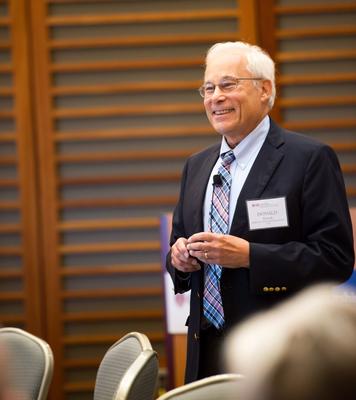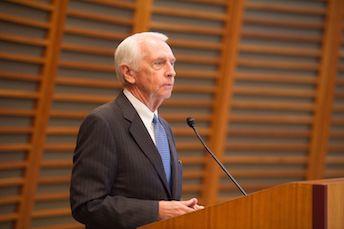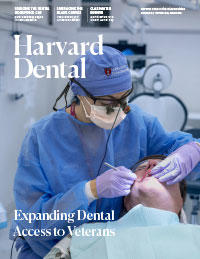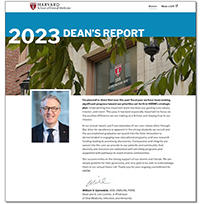
Leaders in academia, business, and health care gathered for the third Leadership Forum, which was hosted by Harvard School of Dental Medicine’s Initiative to Integrate Oral Health and Medicine in late September. The two-day event, held at the Joseph Martin Center in Boston’s Longwood Medical Area, offered a thought-provoking lineup of speakers and panels on the topic of “Achieving Quality and Value in Healthcare through Integration.” This year's Forum focused on innovations in how oral health care is taught, delivered, and funded.
A changing health care landscape

Increasing value in integrated health care
Professor Robert Kaplan, from Harvard Business School, also spoke of the issue of health care value. More specifically, he touched upon why the United States offers the most expensive health care but not the best health outcomes in comparison to other countries. He pointed to fragmentation of care delivered by medical specialties, and suggested that one solution that could lead to better outcomes would be multidisciplinary teams, including oral health professionals, treating patients by medical condition.
Professor Kaplan explained, “We’re trying to improve value at the patient condition level. Not just in that individual transaction, but over the cycle of care for that condition.” He went on to state that for value and outcomes to improve, the approach to providing care must change. “Our goal should not be to organize by medical specialty, but to organize by the patient’s medical condition. When you think of it that way, you think of the multi-disciplinary team that should be assembled to treat that medical condition. Start with the patient and then think about how do we organize to treat that condition.”
Integration of oral health and policy

“You can find out so many things about someone’s health just by a dental visit,” Governor Beshear said. “You can catch chronic diseases or things that are starting to develop. You come across things that bring all other aspects of health care into play. All of this needs to be looked at together. It needs to be a partnership among all kinds of providers,” he added.
Why oral health?

“Oral health care may only be four percent of overall health care, but based upon what we’ve learned so far and the work that is coming out now on the importance of oral health, it probably represents 15 to 20 percent of health care value. That’s why oral health deserves attention,” Dean Donoff said.
He also highlighted the key role that these events play in the future of health care. “Events like this Leadership Forum are important because it lets people network and understand what the Initiative to Integrate Oral Health is doing… it’s about setting an agenda for change,” he said.
Looking ahead
As the Leadership Forum wrapped up, participants shared their thoughts on what they heard and their thoughts on the future of integration.

Jane Barrow, the executive director of the Initiative to Integrate Oral Health and Medicine and the associate dean for Global and Community Health at the Harvard School of Dental Medicine, is hopeful for the future of oral health and medicine.
“The Forum convened speakers and attendees from many different sectors – it was a truly integrated and inspiring event," Barrow said. "I look forward to harnessing the energy of the Forum attendees and shifting the focus of our health system more directly onto the needs of our patients.”


